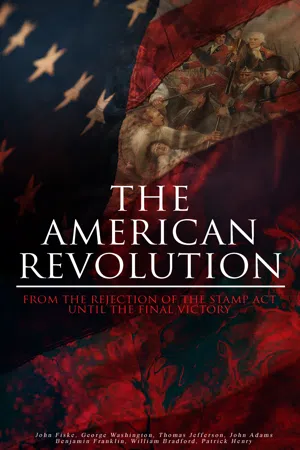History
Colonial Assemblies
Colonial assemblies were legislative bodies established in the American colonies during the 17th and 18th centuries. They were responsible for making laws, levying taxes, and overseeing local governance. These assemblies played a significant role in shaping the political and social landscape of the colonies, and were often a focal point for debates and conflicts with colonial governors and the British Crown.
Written by Perlego with AI-assistance
Related key terms
1 Key excerpts on "Colonial Assemblies"
- eBook - ePub
The American Revolution: From the Rejection of the Stamp Act Until the Final Victory
Complete History of the Uprising; Including Key Speeches and Documents of the Epoch: First Charter of Virginia, Mayflower Compact, The Stamp Act, Continental Association, Declaration of Independence
- John Fiske, George Washington, Thomas Jefferson, John Adams, Benjamin Franklin, William Bradford, Patrick Henry(Authors)
- 2019(Publication Date)
- Madison & Adams Press(Publisher)
In private letters, too, the governors poured forth their complaints into the ears of the Lords of Trade, and these complaints were many and loud. Except in Pennsylvania and Maryland, which were like hereditary monarchies, and in Connecticut and Rhode Island, where the governors were elected by the people, the colonial governors were now invariably appointed by the Crown. In most cases they were inclined to take high views regarding the royal prerogative, and in nearly all cases they were unable to understand the political attitude of the colonists, who on the one hand gloried in their connection with England, and on the other hand, precisely because they were Englishmen, were unwilling to yield on any occasion whatsoever one jot or tittle of their ancient liberties. Moreover, through the ubiquity of the popular assemblies and the directness of their control over the administration of public affairs, the political life of America was both really and ostensibly freer than that of England was at that time; and the ancient liberties of Englishmen, if not better preserved, were at least more conspicuously asserted. As a natural consequence, the royal governors were continually trying to do things which the people would not let them do, they were in a chronic state of angry warfare with their assemblies, and they were incessant in their complaints to the Lords of Trade. They represented the Americans as a factious and turbulent people, with their heads turned by queer political crotchets, unwilling to obey the laws and eager to break off their connection with the British Empire. In this way they did much to arouse an unfriendly feeling toward the colonies, although eminent Englishmen were not wanting who understood American affairs too well to let their opinions be thus lightly influenced
Learn about this page
Index pages curate the most relevant extracts from our library of academic textbooks. They’ve been created using an in-house natural language model (NLM), each adding context and meaning to key research topics.
